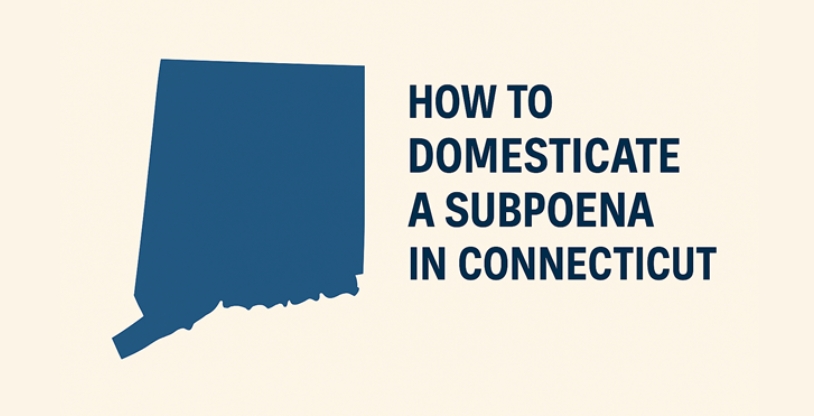
Countrywide Process
July 18, 2025
To domesticate a subpoena in Connecticut, submit your foreign subpoena along with a CIDDA-compliant form and pay a $100 court fee, as per §52-259 and §52-657. No local counsel or hearing is required. Serve it correctly the first time with expert help.
Suppose you’re seeking discovery from a witness or entity located in Connecticut. In that case, your out-of-state subpoena must first be domesticated under Connecticut’s version of the Uniform Interstate Depositions and Discovery Act (UIDDA)—known as CIDDA (C.G.S. § 52-148e(g)).
This process allows a foreign subpoena to be reissued by a Connecticut court clerk without requiring local counsel or judicial involvement in most cases.
Subpoenas issued by courts in other states hold no legal weight in Connecticut unless they’re properly domesticated. CIDDA streamlines this process by allowing attorneys to request a Connecticut subpoena that mirrors the original. Enforcement is only valid once this local subpoena is issued.
Under Connecticut General Statutes § 52-148e(g) and Practice Book § 13-28 to § 13-31, the following requirements apply:
1. File the following as needed in the Connecticut Superior Court
Countrywide Process will handle the filing of the following forms with the court
2. Attach the Foreign Subpoena
Include the original or a certified copy of the foreign subpoena with your application.
3. Pay the $100 Filing Fee
Per C.G.S. § 52-259 and § 52-657, a $100 fee must be paid at the time of filing.
4. Clerk Issues the Local Connecticut Subpoena
No court appearance or motion is required. The Clerk of the Superior Court will issue a Connecticut subpoena that mirrors the foreign one.
5. Serve the Connecticut Subpoena
Service must be completed according to Connecticut law using an authorized server. Countrywide Process ensures compliant service and returns Proof of Service.
Per §52-259 and §52-657, a $100 filing fee is mandatory for the issuance of a foreign subpoena through the Connecticut Superior Court.
Avoid costly errors. Let Countrywide Process handle the entire process—from filing to final service.
Need help with any of our services ? Contact Countrywide Process LLC now for expert assistance! Call 1-888.962.9696 or email us at info@countrywideprocess.com for a free quote today. Don’t wait— get the support you need now!
Yes. Connecticut has adopted the Uniform Interstate Depositions and Discovery Act, which simplifies subpoena domestication for out-of-state cases.
No, local counsel is generally not needed under UIDDA unless the subpoena is contested or requires court enforcement.
Use Form JD-CL-43, available on the Connecticut Judicial Branch website.
File with the Clerk of the Superior Court in the county where discovery will occur.
No, Connecticut does not currently charge a filing fee for subpoena domestication under UIDDA.
Typically, 1–3 business days from submission to issuance by the clerk.
Yes. Subpoenas for business records are recognized and enforceable under UIDDA in Connecticut.
A state marshal, constable, or licensed process server authorized under Connecticut law.
Objections must be filed with the court where the subpoena was issued. A motion to quash or enforce may be necessary.
Yes. We manage everything from form preparation to filing, service, and status updates.